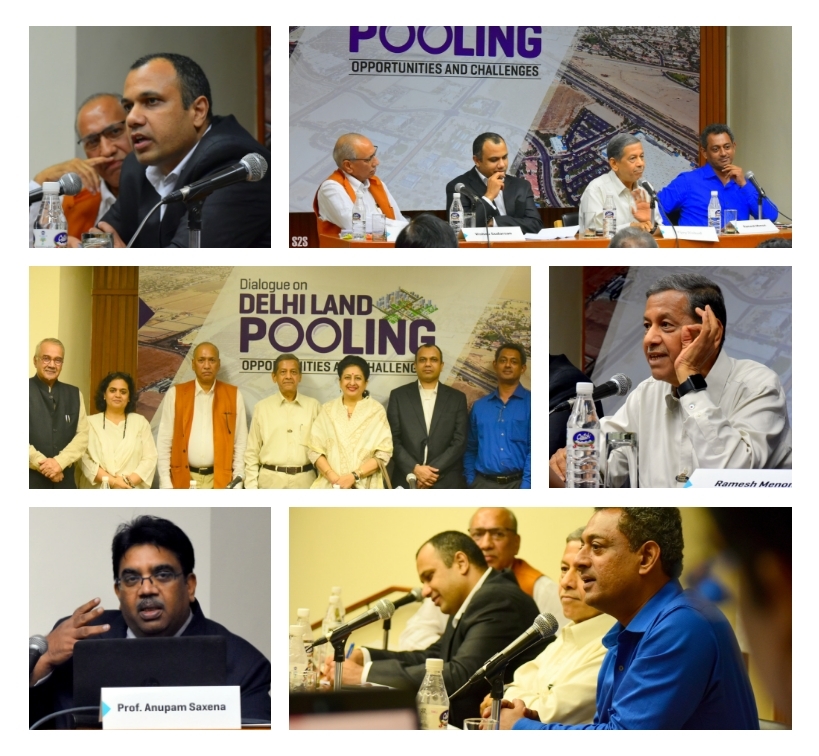
The School hosted a panel discussion on “Delhi Land Pooling Policy: Opportunities and Challenges” with experts from various organizations of the built environment sector on 9 August 2018.
Rapid urbanization is asserting pressure on the peripheries of our metropolitan cities fueling the need for serviced land to provide for the infrastructure, housing, and city amenities. Ownership of land has been a sensitive issue and have spurred explosive emotions. In the past, we have witnessed violent protests from landowners in Sigur and Greater Noida west against land acquisition. Land pooling and land reconstitution provide an effective mechanism for land assembly with the sharing of value enhancement with the landowners. Maharashtra and Gujrat have successfully used land pooling through town planning schemes (TPS) for city expansion. In 2014, The Delhi Land Pooling Policy was adopted as an alternative to land acquisition, in anticipation to release the urban land and address the challenges of the land markets in Delhi through private sector participation. Would this policy be able to meet the expectation of the private sector? What are the implementation challenges? Would this policy be able to meet its objective and expectation of various stakeholders?
Mr. Anupam Saxena MRICS, Officiating Associate Dean and Director, School of Real Estate & Urban Infrastructure was the moderator for the discussion and created an aura of curiosity and interest in the room. The esteemed panelists included Mr Vijay Risbud and Mr Vinod Sakle, both ex commissioners of DDA, Mr Vishnu Sudarsan, Partner, JSA Partners and Mr Ramesh Menon, Founding Director, Certes Realty Ltd.
?width=800&height=640)
The event started with a very informational paper presentation on ‘Stakeholders’ Preferences for Land Assembly: Develop with Rural Urban Synergy’. It was indeed an intensive research conducted by Dr Namrita Kalshi, Joint GM, DMRC on the preferences of stake holders, (whom she had interestingly classified as land resources (LR) being the owner, supply drivers (SD) being government and developers and Demand Drivers (DD) being buyers and investors), in terms of land acquisition. After having given a brief introduction about the formulation and the need for Land Pooling Policy (LPP), she instanced a few landmark cases such as Nandigram SEZ. Later, she explained the research methodology adopted by her in detail. An ANNOVA was carried out to perform a statistical analysis of stakeholders’ response and the findings show that people in the development scenario always find themselves at crossroads between two options, the safe option and the speculated option and land pooling and joint venture fell under the safe option and hence, proved to be the most preferred option.
The enlightening presentation was followed by a quick and precise context setting by Ms Aparna Soni, Asst Professor, School of Real Estate & Urban Infrastructure. She apprised everyone with the information about the reforms brought about in the LPP which was originally formulated in 2013. The expected outcomes of the LPP of 2013 include solution to housing deficit, availability of affordable housing, increase in private sector participation, etc. The new amendment does not allow fragmentation of land and the residual FAR has been brought down to 200 from 400. Also, specific form-based codes are to be followed. The presentation ended with the million-dollar question of whether LPP is a game changer.

The main event of the day began without any delay, after the stage was set beautifully by Ms Soni. The experts gave their views with facts and figures supporting them. Mr. Menon pointed out that the original beginning of LPP can be tracked down to the master plan drafted in 2007 and essentially, 11 years have been lost so far and it is not just loss of time, but also of credibility and money. Furthermore, he raised the issue of policy making bodies getting entangled in their own web as multiple authorities counteract each other.
Also, LPP does not seem to be enticing to large investors because of the reduced FAR. The urbanization has grown to such a large scale that institutional capital is required, which does not seem to be possible with the new amendment.
Mr. Vijay stated that the amendment brought about in LPP can be owed to changing view of the central government, particularly the fact that it wanted the policy to be more liberal with each passing year. He also pointed out that the changes brought about in LPP has forced the small land owners to join the private consortium as opposed to the earlier scenario. Form based development is the most subjective development proposition and it will take quite a long time to get implemented. He added that form specific development cannot be adopted practically as there will be no continuity of ownership, if DDA 2018 is implemented.
Mr. Vishnu being a renowned lawyer, gave a legal perspective saying that a policy cannot be arbitrary and that proposed amendments don’t look at consumer interest nor reduce the ease of investment. Furthermore, he raised the requirement of sunset clause which clearly defines the point of interference of government. Mr Vinod elucidated the cause and effects of LPP very well stating the hurdles that are to be faced currently in order to implement the LPP 2018 such as all zonal plans have to be modified which will take atleast 2 or 3 years and that the very definition of developer entity has changed and it will take at least 5 or 10 years to implement the policies.
Overall, the discussion was truly an eye opener for people who were ignorant of the time taken to implement the policy and the impacts of the new amendment of LPP.